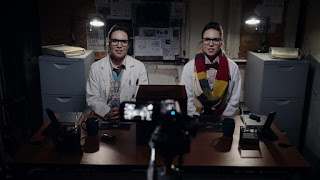SPOILERS
first and foremost, as I’m leaping into some discussion of the last Doctor Who storyline to make a point about my own political philosophy.
When I wrote yesterday’s review of The Zygon Inver(a)sion, I felt like it didn’t quite reach a point that it should have. It never got to what Bonnie the Zygon actually did when she turned away from revolution and became a new Osgood.
Bonnie never turned away from revolution to stand her rebellion down and become a peacemaker. The words of the Doctor made it clear: the real revolution is turning away from violence and retribution as a go-to response to injustice.
Bonnie started The Zygon Inva(er)sion as just another fighter. She ended The Zygon Inver(a)sion as a true revolutionary because she fundamentally changed her values.
Yesterday, I spoke about the message of peace in The Zygon Inver(a)sion, how the leader of a violent rebellion can be forgiven. She was violent without a doubt, a radical in every sense of the word.
She led a retaliatory massacre of all the humans in her new hometown in America, killed several UNIT troopers and kidnapped enough to infiltrate the organization with duplicates, and worst of all, victimized an innocent Zygon who wanted nothing to do with her insurgency to make him a catalyst for spreading fear and violence between humans and Zygons.
Any peace settlement would require her punishment. Bonnie even says at one point that she can’t endorse peace, because she’d never be allowed to live if she surrendered.
I wouldn’t be surprised if people call for the death of an insurgent leader who acted with such brutality. It’s a popular idea in the West to execute terrorist leaders without trial, including even their families in drone bombings.
It’s similarly popular to imprison terrorists without trial and torture them. Even with a trial, they’re usually put in solitary confinement for life, tortured for decades by locking them away from any human contact.
It’s a popular law in my country of Canada to strip those who’ve been convicted of terrorist crimes of their Canadian citizenship, and deport them to whatever country still holds their alternative citizenship. Even if they’ve served their time.
When Saad Gaya is released from prison, as the law still stands, he’ll be stripped of Canadian citizenship and deported to Pakistan, a country where he’s never lived. No matter how much he may genuinely regret and renounce his actions as a terrorist plotter. The Harper government wrote this law; the current Trudeau government was critical of this when they were in opposition, but supported many other invasive and dangerous anti-terror laws.
We kill, maim, torture, and imprison terrorists, their families, and their supporters because we believe it is right to punish people for their crimes. We think it’s appropriate, moral, and just to bring equal or greater violence on the perpetrators of violence. Retribution is the most popular model of justice in the world.
It’s wrong. That simple. Retribution is wrong.
It perpetuates the cycle of violence that the Doctor denounces in The Zygon Inver(a)sion, but humanity’s desire for retribution also does much worse to humanity itself. It makes us think that it’s moral to bring violence on people.
We often think of morality as a set of rules endorsed by authority. This is the vision of morality in most mainstream religions. God is the ultimate authority who polices us with divine punishment through the afterlife or karmic misfortune. God’s rules for our action are morality, for no other reason than the authority of God.
This is what lies behind the popular belief that atheists can have no moral centre. This is why people hate atheists: they believe that because an atheist doesn’t believe in a God who will punish them for breaking moral rules, they’ll do whatever violence they can get away with because they don’t believe in moral right or wrong at all.
 |
| Part of what I've come to love in Doctor Who since understanding this idea is that the Doctor's ethics largely correspond to the progressive conception of Nietzsche's thought. |
But being ethical has nothing to do with morality. This is the fundamental insight of Friedrich Nietzsche, and a further expression of Doctor Who’s Nietzschean character. Bonnie has given up her moral values that would answer violence with greater violence. Having sincerely done that, she’s forgiven.
That forgiveness of her crimes gives her the space to become a peacemaker, managing and negotiating conflicts that arise among her people and between her people and their majority community, humanity.
The real revolution was this ethical transformation: she’s changed the whole mission of her life. The immediate metaphor was in changing her form to become a twin Osgood. But her transformation was ethical. She changed her entire purpose in life from revenge, retribution, and punishment to repair, healing, and peace-building.
Any revolutionary movement that doesn’t have this model doesn’t deserve the name.


Agreed entirely with this. I don't think enough emphasis has been placed on how bold it was for the episode to redeem Bonnie, for her to be deemed a more fitting person to keep the peace than Kate, who still hasn't learned, not truly (probably some some interesting parallels to be drawn between this and the "forget" button from "The Beast Below"). I had some qualms with the pro assimilation side of the narrative, even if that was necessary due to Doctor Who's production issues. But the fact that the episode was willing to forgive Bonnie is such a brave decision it cancels out most of my issues with the episode's politics.
ReplyDelete